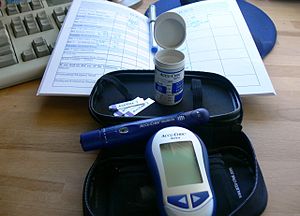
Here are some common problems diabetics can face when it comes to getting the sleep they need.. (Photo credit: Wikipedia)
There has been much talk of late about the link between Type 2 Diabetes and Sleep Apnea, but this is not the only sleep disorder or sleep disturbance experienced by people with this disease. As sleep can have such a significant effect on things like blood sugar, those with this condition need to understand the other sleep struggles that can occur and complicate management of their diabetes.
Here are some of the most common problems diabetics can face when it comes to getting the sleep they need and some tips for creating a sound sleep hygiene routine to protect the sleep they get.
Disruptive Limbs
RLS (restless leg syndrome) is a sleep disorder that causes strange sensations in the legs which can make it very difficult to fall asleep. It disrupts sleep by keeping the person awake when they should be sleeping, shortening the window of opportunity for getting the sleep they need. PLMS (periodic limb movement in sleep) is another sleep disorder that can cause sleep disruption. In PLMS, the limbs move rhythmically throughout the night resulting in frequent waking and/or a feeling similar to that experienced with sleep apnea of not being refreshed in the morning.
Pain
Neuropathy, a medical condition that frequently occurs in those with diabetes can also disrupt sleep. This condition causes damage to the peripheral nerves and can cause pain and numbness in hands and feet. Those with the condition can struggle to get the sleep they need because of the recurring pain. Neuropathy can be treated with medication and it is important that those with diabetes who are experiencing any difficulties with pain or numbness in their extremities and sleep disturbances discuss this issue with their doctor.
Low Blood Sugar
Another reason people with diabetes struggle to get the sleep they need is nighttime hypoglycemia. During these episodes, the blood sugar gets too low. If blood sugar gets too low during sleep it can cause nightmares, night sweats, and sudden waking with a feeling like something bad is about to happen. People experiencing nighttime hypoglycemia may also wake up with a bad headache. All of these symptoms can cause serious sleep disruption resulting in a sleep deficit regardless of the amount of time spent in bed. Anyone with type 1 diabetes or those with type 2 diabetes who are being treated with insulin can experience this problem.
What You Can Do
If you are experiencing any difficulties with sleep, you should make an consultation appointment with one of our certified sleep doctors to discuss your concerns. Getting enough sleep has been shown to help when managing diabetes which means anything that disrupts your sleep needs to be discussed with a doctor. In addition to a consultation with one of our sleep doctors, you can work on developing better sleep habits or hygiene. This has also shown to be beneficial in managing this disease. Focus on going to bed and getting up at the same time every day and developing a consistent bedtime routine that alerts your body that it is time for bed. Avoid caffeine, alcohol, and exercise in the hours leading up to bedtime, and turn off all electronics at least an hour before you go to bed.
Related articles
- 3 Things You Need to Know About Diabetes and Sleep (valleysleepcenter.com)
- Does My Child Have Sleep Apnea? (valleysleepcenter.com)
- Can Losing Sleep Lead to Diabetes? (valleysleepcenter.com)

